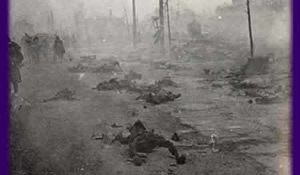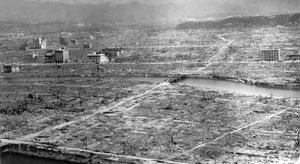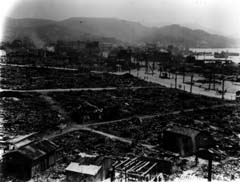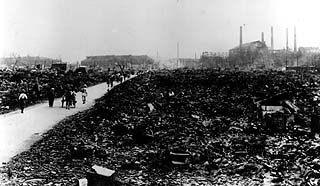Meetinghouse
Seventy-two years ago last night, on the night of March 9 and the early morning of March 10, 1945, the United States government ordered 334 B-29 bombers, commanded by Curtis LeMay, to drop 1,665 tons of napalm, white phosphorus and explosives on the most densely-populated residential neighborhoods throughout Tokyo. Within the first two hours of low-altitude firebombing the city’s fire defenses were completely overwhelmed. The burning ignited a firestorm that blew through the city streets at 600-1800 degrees Fahrenheit. Over 200,000 buildings were reduced to ash. Over 1,000,000 people were left homeless. About 100,000 Japanese civilians burned to death in a single night on the orders of General Curtis LeMay and President Franklin Delano Roosevelt.
From The Firebombing of Tokyo, by Rory Fanning, in Jacobin:
Toshiko Higashikawa, who was twelve at the time of the bombing, recalled:
There was fire everywhere. I saw one person caught by the claws of the fire dragon before you could say Jack Robinson! Her clothes just went up in flames. Another two people were caught and burned up. The bombers just kept coming.Toshiko and her family fled to a neighborhood school, seeking shelter from fire. The family bottlenecked in a doorway, and Toshiko could hear children shouting:Gya. Help! Its Hot! Moma! Uwa! Daddy! It hurts! Help!Moments later, Toshiko lost the grip of her father's hand in the frantic crowd. Her father was holding her younger brother Eichi in his other arm. Toshiko and her sister made it out of the schoolhouse alive. She never saw her father and brother again.
Koji Kikushima, who was thirteen at the time, tells the story of running down a street as fire chased her family and hundreds of others. The heat was so intense she instinctively jumped off a bridge into a river below. She survived the fall. In the morning she emerged from the river to see a "mountain of corpses" on the bridge. She never saw her family again.
Sumiko Morikawa was twenty-four that day. Her husband was off fighting in the war. She had a four-year-old son Kiichi, and twin eight-month-old girls Atsuko and Ryoko. As the fire began to burn the homes in her neighborhood, Sumiko ran towards a park pool with her kids. Nearing the pool's edge, four-year-old Kiichi's jacket caught fire. . . .
. . . There were nearly a million casualties that day in Tokyo and countless stories like the ones above. However what is mostly absent from Hoyet's book are personal reflections from men about what it was like that day. It's because cities like Tokyo and Nagasaki were essentially devoid of them. . . . The remaining population, and hence the main targets of the bombing, were disproportionately women, children, and the elderly. The majority of the military-age men were away fighting in the war.
. . . World War II was carried out with brutality on all fronts. The Japanese military murdered nearly six million Chinese, Korean, and Filipino civilians by the end of it. However, to argue that Japanese civilians deserved to die — that children deserved to die — at the hands of the US military because their government killed civilians in other Asian countries is an indefensible position, in any moral or ethical framework.
–Rory Fanning, The Firebombing of Tokyo
Jacobin, March 9, 2015




